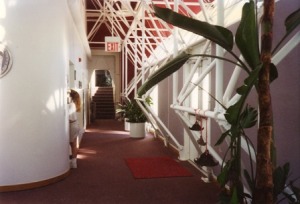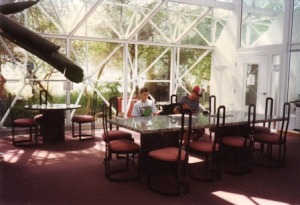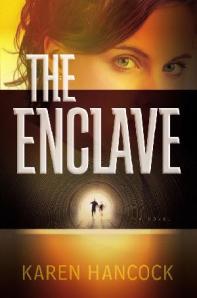Well, another CSFF Blog Tour comes to a close. I found it fun and informative, and was pleasantly surprised by the level of participation and the number of really good posts.
Becky Miller, apparently the CSFF Blog Tour Overlord (who would have guessed?) finally unveiled her own review of The Enclave, which I found quite insightful.
Becky’s essay at Speculative Faith called The Truth in Speculative Fiction: a Look at The Enclave by Karen Hancock is also well worth reading.
Rachel Starr Thomson did an excellent Third Day post on men trying to be God.
Elizabeth Williams did three detailed, thoughtful and very thorough posts on various aspects of the book. On Day 1 she gave an overview, on Day 2 she shared her observations about the scientific aspects of the story and her desire for … well, more development. At which point I was ruefully reminded of my struggles to keep to the allotted word count, which I exceeded, and to finish in the allotted time, which I grossly exceeded! But oh well. The book is what God wanted it to be and all books have flaws.
More than that, no book is going to satisfy everyone, though admittedly, from Elizabeth’s final post on Day 3, when she considered the Christian aspects, it seemed she was overall more satisfied than not. (I particularly appreciated this last post of hers)
For his Day 2 post, John Otte detailed his objection to my inclusion of Nephilim into the story, provoking a number of interesting comments. So many, in fact, that he decided to scrap his original Day 3 post and continue the discussion of Nephilim in Christian fiction . He also offered a sort of apology. I love that he takes into account his own perspective and frame of reference and acknowledges it in his approach.
Because in all this talk of Nephilim several have suggested that the people who think these creatures were half human/half angel have arrived at that conclusion solely based on a reading of the English translation of Genesis 6:1-4, I’ve decided to address that issue today as something of a wrap-up.
Being one of those who believe they were indeed human/angelic crossbreeds, I can attest to the fact there’s more than just the English Gen 6 that has led me to that conclusion. And I’m not talking about The Book of Enoch, which one person cited as a probable source. I had arrived at my conclusion long before I’d ever heard of The Book of Enoch, though I did skim it in preparation for writing The Enclave. To me it seemed obviously not written by God but some legalistic somebody… so I give it no more credence than Greek myths — which like many other myths most likely contain seeds of truth, and may record the traditions of belief at the time of writing, but are not the absolute truth of God’s word.
No, my reasons come pretty much straight from the word of God:
Item #1
The phrase in Gen 6, “sons of God” is “beni ha Elohim” in the Hebrew. It is a phrase used only three other times in the scriptures, all three in Job. I would note that Job is regarded as the oldest book of the Bible in terms of content — that is, the events it records occurred before Abraham and were believed to have been part of an oral tradition that pre-existed the writings of Moses (which Moses would have known about), though it was actually preserved in written form some time after he wrote the Torah.
Job 1:6 Now there was a day when the sons of God came to present themselves before the Lord and Satan also came among them.
Job 2:1 Again there was a day when the sons of God came to present themselves before the Lord, and Satan also came among them to present himself to the Lord.
(Since they are presenting themselves to the Lord in heaven it’s pretty obvious these are angels)
Job 38:7 — the last line of a passage wherein God asks Job where he was when “I laid the foundation of the earth! Tell me if you have understanding. Who set its measurements, since you know? Or who stretched the line on it? On what were its bases sunk? Or who laid its cornerstone when the morning stars sang together, and all the sons of God shouted for joy…”
This reference is also pretty obviously depicting angels, if the earth was still in the process of being created as they were singing and shouting. Additionally, the morning star phrase links to Is 14:12 where it refers specifically to Satan, before his fall.
Item #2
First Mention Principle. One of the means of understanding what a term or phrase means in the Bible is the “First-Mention Principle” wherein you look at the first time a word/phrase is used to glean its meaning for later usages. Looking at beni ha Elohim in Genesis 6, its first usage could certainly be ascribed to angels, but it’s inconclusive. However, if you consider that Job is the earliest surviving account through oral tradition, then technically Job is the first mention of the phrase, where the usage is not at all inconclusive. And as I mentioned earlier, Moses was probably familiar with it.
Item #3
Genesis 6:2 says that the sons of God saw that the daughters of men were beautiful; and they took wives for themselves, whomever they chose.
“took wives” is laqach, the BDB Definition of which is “to take, get, fetch, lay hold of, seize, receive, acquire, buy, bring, marry, take a wife, snatch, take away”
Other scholars suggest “to take by sheer strength, overwhelming whoever protected them.” Thus an alternate translation could be, “seized women for themselves, whomever they chose.”
Which sounds like rape and conquest to me. An examination of ancient history and cultures, especially Greek mythology, shows that women were more often taken and snatched and seized as wives than they were “married” as we know it today.
Item #4
If the sons of God were just men, and the daughters of men were just human women, then why bother referencing some special kind of progeny? ie, “Nephilim” who were around “in those days and also afterward.” Wouldn’t they be the same as other people? Why call them mighty men? Why use the same term later to refer to the giants in the land? Giants who clearly weren’t just regular men if the Jews saw themselves as grasshoppers in their sight.(Numbers 13:33)
Item #5
Jude and 2 Peter tell of a special group of angels who sinned in a particular way, different from the rest, who are currently being kept in prison:
Jude 6ff And angels who did not keep their own domain, but abandoned their proper abode, He has kept in eternal bounds under darkness for the judgment of the great day. Just as Sodom and Gomorrah and the cities around them, since they in the same way as these indulged in gross immorality and went after strange flesh (ie, flesh they were forbidden to go after, including flesh of a lower creation), are exhibited as an example in undergoing the punishment of eternal fire.
The angels who did not keep their own domain are equated in this passage with some sort of sexual sin comparable to the sin of homosexuality of Sodom and Gomorrah, a sin God refers to as an abomination in Lev 18:22 comparable with copulating with animals (a lower creation), forbidden in Lev 18:23
2 Peter 2: 4,5 For if God did not spare angels when they sinned but cast them into hell (the Greek word here is Tartarus) and committed them to pits of darkness reserved for judgment; and did not spare the ancient world, but preserved Noah, a preacher of rightousness with seven others, when He brought a flood upon the world of the ungodly;
These verses tie the angels to a sin of “gross immorality” outside the boundaries God had apparently set up, and are here clearly linked to the judgment that came upon the pre-flood world.
I consider this, taken together with Gen 6 and the verses in Job to be convincing support for the angelic/human crossbreeding interpretation.
Item #6
Why would the angels do this? Just out of lust?
I think it’s because Satan was right there when God made his promise to the woman in Genesis 3 that the human race would be saved through her seed and that that same seed would crush Satan’s head. I think he wanted to thwart that plan by corrupting the genetics of the human race so that it was no longer human. Then the promise of a purely human female seed could not be fulfilled and God would be proven a liar.
The first sentence of that paragraph is supportable in Gen 3. The second is logical extrapolation. There are other verses that do support it indirectly, but that involves many more doctrines than I want to pursue in this wrap-up which is already long enough. I’ll save it for another time.
Again, I want to thank everyone who participated for taking the time to read and review The Enclave — or at the least just make mention of it on their blogs — and especially those who went the extra mile in providing additional reflections, comments and humor.
Like this:
Like Loading...



 Dining area inside Biosphere 2
Dining area inside Biosphere 2 Way back in the late 80’s and early 90’s, long before I began developing The Enclave, Biosphere II was a hot topic around Tucson, one I followed with great interest. It was (and is) a giant greenhouse designed to be a completely self-sustained world, cut off from any dependence upon earth, including air and water. Inside, 8 volunteers spent two years of their lives, from 1991 to 1993, seeing if they could survive without opening the hatch. (For the record, they could not.)
Way back in the late 80’s and early 90’s, long before I began developing The Enclave, Biosphere II was a hot topic around Tucson, one I followed with great interest. It was (and is) a giant greenhouse designed to be a completely self-sustained world, cut off from any dependence upon earth, including air and water. Inside, 8 volunteers spent two years of their lives, from 1991 to 1993, seeing if they could survive without opening the hatch. (For the record, they could not.)


